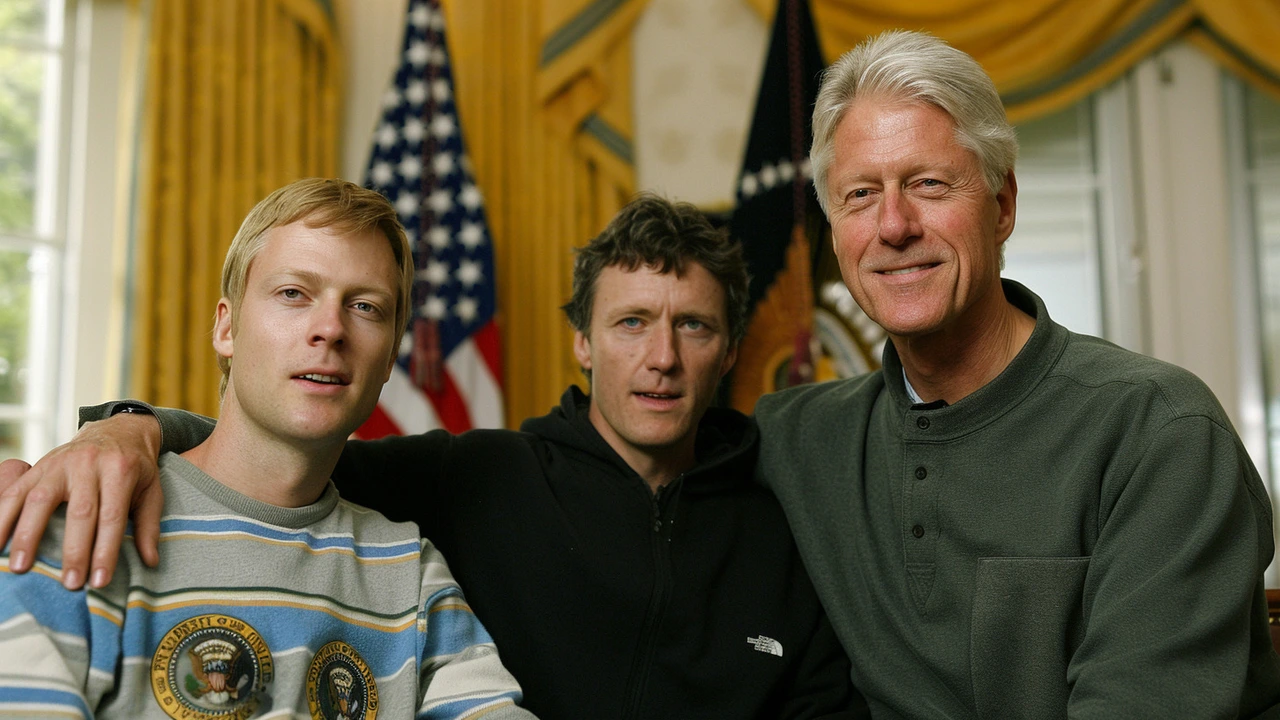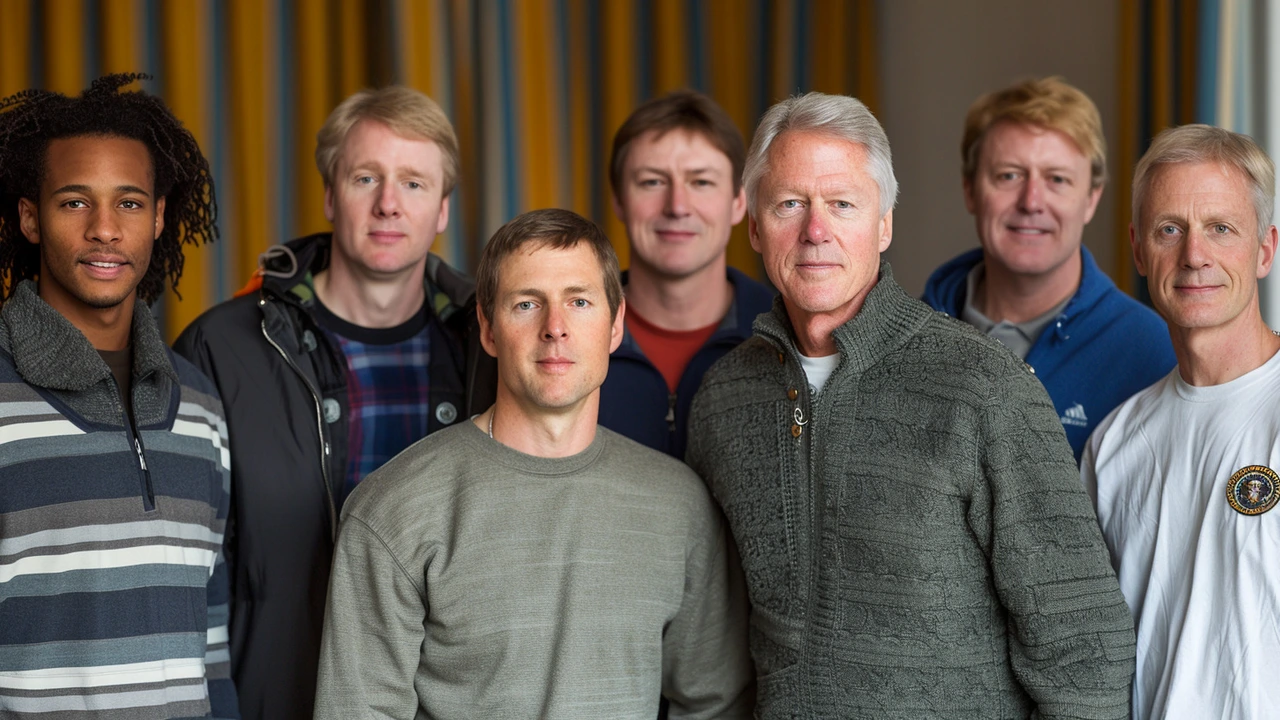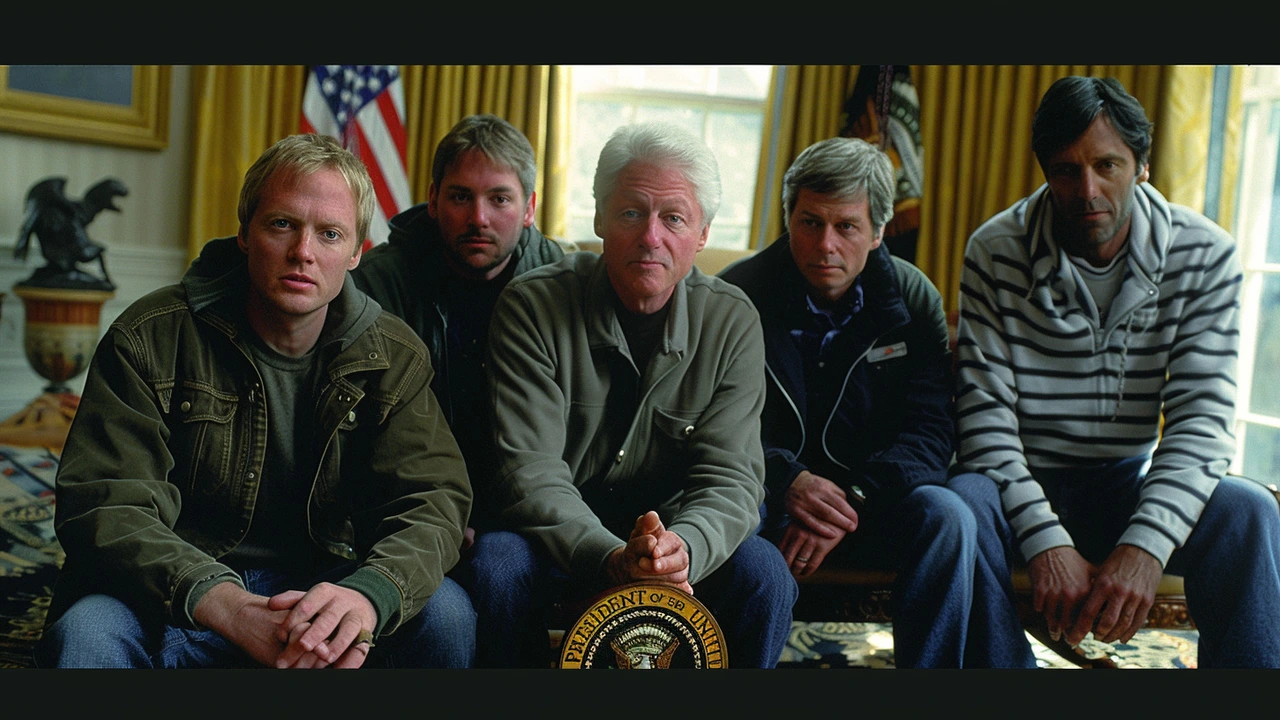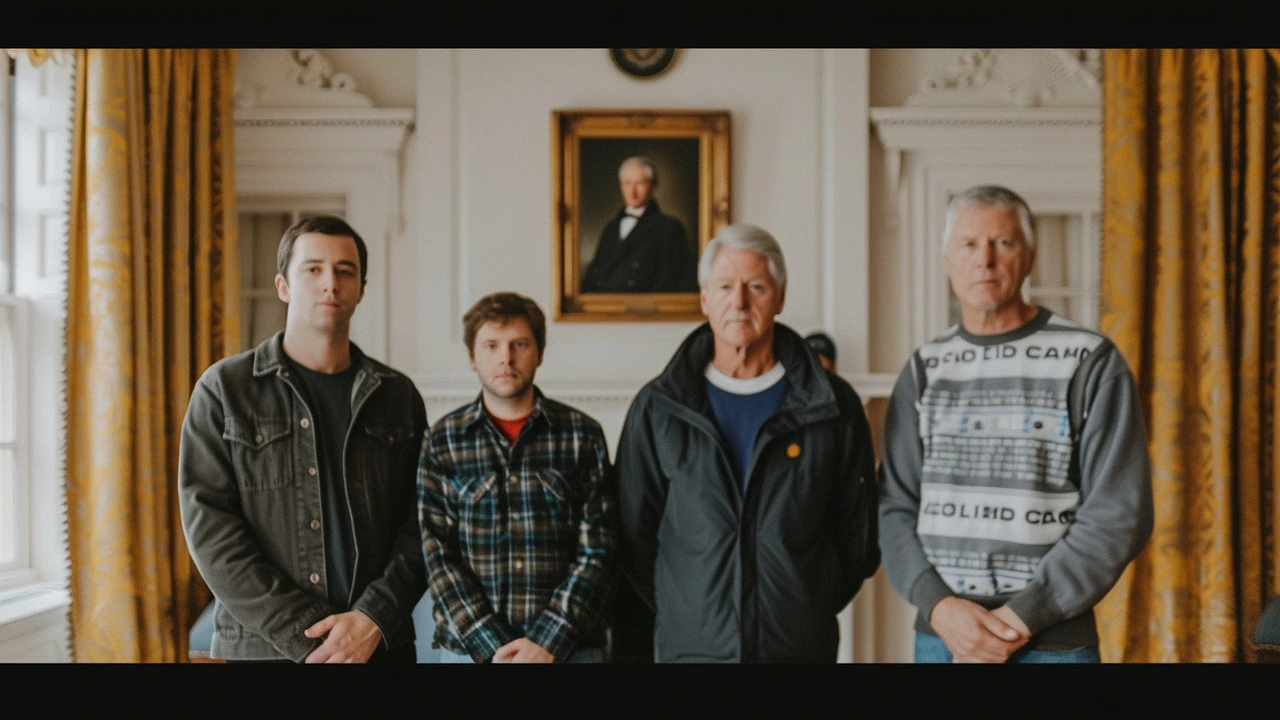Pearl Jam's Fight Against Ticketmaster
April 9, 1994, marks a significant day in music history, where Pearl Jam, one of the most influential rock bands of the 90s, took their fight against corporate greed directly to the White House. That year, the band, riding high on the success of their sophomore album 'Vs.', met with then-President Bill Clinton to discuss Ticketmaster's monopolistic grip on the concert ticketing industry.
This meeting, coming just days after the tragic death of Kurt Cobain, was charged with emotion and determination. Pearl Jam, led by frontman Eddie Vedder, detailed how Ticketmaster’s dominance led to exorbitant ticket prices and severely limited fan access. They painted a vivid picture for the President, explaining how the system was increasingly pricing out dedicated fans and foregoing the inclusive spirit of rock and roll. The band hoped Clinton's influence could help dismantle this monopoly and create a more equitable system for fans and artists alike.
The issue of Ticketmaster’s monopolistic practices was not new, but Pearl Jam was one of the few high-profile bands willing to tackle it head-on. They outlined how the company's control over ticket distribution forced fans to pay inflated fees above the face value of tickets. Moreover, Ticketmaster's contractual arrangements with concert venues created a stranglehold, preventing competition and keeping other ticketing services from gaining a foothold. This lack of competition meant that fans often had no choice but to pay the high prices dictated by Ticketmaster.
The Complexity of Monopoly
President Clinton listened attentively, acknowledging the band’s concerns. He sympathized with their plight but also emphasized the complexity of the issue. Clinton explained that breaking up a monopoly required significant legal and regulatory adjustments, which could be both lengthy and challenging. He encouraged Pearl Jam to consider alternative strategies, such as collaborating with other artists and promoters to create a parallel, competitive ticketing market.
Despite Clinton's cautious response, Pearl Jam found solace in the fact that their concerns had reached the highest office in the land. They were spurred on to continue their activism. The band began to explore various avenues to alleviate the burden on their fans while attempting to undermine Ticketmaster's grip on the industry.
One of Pearl Jam's strategies was to refuse to play in venues that had exclusive deals with Ticketmaster. This bold move, although logistically challenging and financially risky, underscored their commitment to the cause. It turned their concerts into a battleground for ticketing fairness, emphasizing their dedication to their fanbase over profit margins.

A Legacy of Change
Over time, Pearl Jam’s relentless campaigning started to pay off. Their efforts brought significant media attention to the issue, and the band garnered support from a myriad of artists, fans, and even lawmakers. Public awareness grew, and the pressure on Ticketmaster mounted. Lawsuits were filed, and government investigations into the company's business practices ensued.
By the early 2000s, the cumulative effect of these efforts began to show. New ticketing companies emerged, providing viable alternatives for artists and fans alike. The rise of the internet also played a crucial role, enabling direct artist-to-fan ticket sales, circumventing traditional ticketing channels entirely. While Ticketmaster remained a major player in the industry, its stranglehold was significantly loosened, resulting in a more balanced and competitive marketplace.
Pearl Jam’s 1994 White House meeting with Bill Clinton remains a poignant example of how artists can use their influence to champion social change. The band's activism extended beyond their music, demonstrating their commitment to fairness and accessibility in the concert experience. They effectively harnessed the power of rock to advocate for the fans who supported them, embodying the authentic spirit of the genre.

Continuing the Fight
Even today, the battle for fair ticketing practices continues. Pearl Jam's legacy in this sphere serves as an inspiration for both emerging and established artists to use their platforms for the greater good. The evolution of technology and the music industry landscape brings new challenges and opportunities for ensuring fans have access to the performances of their favorite artists without undue financial strain.
In retrospect, the meeting with President Clinton served as a catalyst for change, galvanizing a movement that highlighted a critical issue within the music industry. While the resolution did not come overnight, the steadfast dedication of Pearl Jam and their allies laid the groundwork for a more equitable ticketing system that benefits both fans and artists.
The Power of Advocacy
The Pearl Jam vs. Ticketmaster saga is a testament to the power of advocacy and the impact that dedicated individuals can have on entrenched systems. By taking a stand, Pearl Jam demonstrated that artists need not be passive participants in the industry but can be active agents of change. Their story encourages today's artists to remain vigilant about unfair practices and to work towards creating a more just environment for all stakeholders in the music world.
As we celebrate the 30th anniversary of Pearl Jam's White House plea, it's important to recognize the strides made since then and to acknowledge that ongoing efforts are crucial. The lessons learned from this historic battle continue to resonate, reminding us of the importance of fighting for fairness, transparency, and accessibility in all areas of our lives.

Conclusion
Pearl Jam's confrontation with Ticketmaster, highlighted by their pivotal meeting with Bill Clinton, marks a bold chapter in the annals of rock history. It's a story of resistance, advocacy, and the quest for fairness that continues to inspire artists and fans around the world. As we reflect on this significant juncture, it's clear that the spirit of Pearl Jam's activism lives on, echoing through each concert ticket bought and sold with an eye towards equality and mutual respect.


Comments
pradeep kumar
While the story sounds heroic, it’s a classic case of rock stars whining about price gouging that existed long before they cared to notice.
May 24, 2024 at 18:40
love monster
The meeting exemplifies a strategic stakeholder alignment where artists leveraged political capital to disrupt a legacy monopoly-a textbook case of market entry pressures catalyzed by activist branding.
By initiating a dialogue at the executive level, Pearl Jam operationalized a form of regulatory lobbying that set a precedent for future industry‑wide negotiations.
May 27, 2024 at 02:13
Christian Barthelt
The narrative that Pearl Jam single‑handedly toppled Ticketmaster is, in reality, an overblown myth.
Ticket resale markets have existed since the dawn of live performances, independent of any 1990s grunge act.
The band’s meeting with the Clinton administration was merely a PR stunt, designed to amplify their brand rather than effect substantive policy change.
Moreover, the legal framework governing antitrust violations was already in flux, rendering the White House visit a nominal footnote.
The claim that the band’s refusal to play in Ticketmaster‑aligned venues created a competitive alternative is questionable, as most major arenas would not have booked them anyway.
It is also worth noting that the subsequent emergence of online ticket platforms owes more to technological innovation than to activist pressure.
While Pearl Jam’s activism raised public awareness, it did not directly precipitate the lawsuits that later challenged Ticketmaster’s practices.
In fact, the dominant market share persisted well into the 2000s, with the company adapting its fee structures rather than ceding control.
The band’s moral high ground is further undermined by their own use of secondary market tickets for charity gigs, which indirectly legitimized the very scalping they condemned.
Critics who celebrate the band’s efforts often ignore the broader economic incentives that drive ticket pricing, such as venue costs and production expenses.
The focus on a single band distracts from systemic issues like venue exclusivity contracts that bind promoters to a single ticketing provider.
Furthermore, the federal response was timid, offering only vague encouragement rather than concrete regulatory action.
This lukewarm reaction underscores the limited influence that even high‑profile artists have on entrenched corporate structures.
Ultimately, the Pearl Jam story should be viewed as a symbolic gesture rather than a decisive turning point in ticketing reform.
The true progress in the market emerged from a confluence of consumer activism, legislative scrutiny, and disruptive technology, not solely from a 1994 White House meeting.
May 29, 2024 at 09:47
Ify Okocha
Another self‑congratulatory anthem about ‘fighting the system,’ yet the ticket scalpers still thrive.
May 31, 2024 at 17:20
William Anderson
Alas, the tragedy of fan exploitation is not a mere anecdote; it is the epic saga that defines the modern concert experience.
June 3, 2024 at 00:53
Sherri Gassaway
When a band steps into the political arena, it raises questions about the ethical responsibilities of artists as cultural architects.
Is the act of demanding fairness a genuine altruistic endeavor, or merely a performative gesture that bolsters their mythos?
The answer likely lies in the tension between artistic intent and commercial necessity.
Nonetheless, the dialogue they sparked forces us to confront the commodification of art in the age of neoliberal capitalism.
Such introspection is vital, even if the practical outcomes appear modest.
Ultimately, the fight becomes a mirror reflecting society’s broader struggle for equitable access to shared experiences.
In that sense, Pearl Jam’s stand is both a protest and a philosophical proposition.
June 5, 2024 at 08:27
Milo Cado
Love seeing bands use their platform for good – keep the fight alive! 😊
June 7, 2024 at 16:00
MONA RAMIDI
Enough with the feel‑good platitudes – the real battle is still out there, and fans are still paying outrageous fees.
We need more than emojis; we need action.
Let’s keep the pressure on.
June 9, 2024 at 23:33
grace riehman
Yeh, this story is kinda lit. peepo should remember how music can bring peeps together.
June 12, 2024 at 07:07
Vinay Upadhyay
Oh, great, another heroic tale about a band battling a corporate behemoth – because that’s never happened before.
Sure, they walked into the White House, but did the tickets actually get cheaper? Spoiler: not really.
It’s impressive how quickly we turn a PR moment into a quasi‑revolutionary legend.
Meanwhile, fans continue to fork over cash, and the scalpers smile.
June 14, 2024 at 14:40